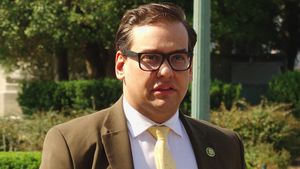(CNN) — A law passed 150 years ago that banned the mailing of contraceptives, lewd materials, and drugs that induce abortions could provide a pathway for effectively banning abortion nationwide — even in states where the procedure is legal.
When the Supreme Court last summer reversed Roe v. Wade and eliminated constitutional protections that guaranteed abortion rights nationwide, the conservative majority fashioned its ruling as returning the matter of abortion policy-making to elected officials, particularly in state legislatures.
But the battle lines now being drawn around the Reconstruction-era federal law — the Comstock Act — are an example of how the picture after Roe v. Wade is far more complicated as abortion opponents are challenging the means of abortion, such as the drug mifepristone, in court.
The most sweeping Comstock Act arguments from anti-abortion activists could at the very least end the availability of medication abortion, which make up the majority of abortions in the US today, and could have the effect of eliminating surgical abortions as well by restricting the shipment of medical instruments and supplies used in the procedure.
"Comstock is really the backdoor way to remove access to abortion across the whole country," said Greer Donley, a University of Pittsburgh Law School professor who specializes in abortion law.
A fight over the reach of the law and how it can be deployed is beginning to brew in court. It has also been on the radar of state and local officials. But the the end goal is a GOP-led federal government willing and empowered to wield the law in a way that could make it impossible for abortion providers to operate.
If the current proxy legal battles over the statute's meaning unfold in the way abortion opponents hope, enforcement of the law could be a central issue in the 2024 White House race and congressional campaigns, given federal lawmakers' power to repeal it.
'Now that Roe is gone'
The Comstock Act, first passed in 1873, is named after Anthony Comstock, who was a special agent of the US Postal Service and an anti-vice crusader.
The law's critics say it's discriminatory against women, pointing out that at the time of its adoption, women could not vote and the Supreme Court had not yet interpreted the Constitutional Equal Protection Clause to prohibit sex discrimination.
The statute bans the mailing of articles or things "designed, adapted, or intended for producing abortion, or for any indecent or immoral use," and in a separate section, describes its prohibition as being on "any drug, medicine, article, or thing designed, adapted, or intended for producing abortion."
Prosecutions under the law were bought in the first few decades after its passage, but by the 1930s, courts began whittling down some of its provisions and enforcement of the law ceased. Congress meanwhile amended it in the 1970s to remove its ban on mailing birth control.
Anti-abortion activists contend, however, that the part of the statute having to do with abortion-inducing drug remains good law, even if there was no appetite for enforcing it while the Supreme Court's 1973 Roe v. Wade precedent — which protected abortion rights nationwide — was on the books. That precedent was overturned by the high court's conservative majority last June.
"Now that Roe is gone, the law springs back into life," said Roger Severino, the vice president of domestic policy at the conservative think tank, the Heritage Foundation, who also served as a top civil rights lawyer in the Department of Health and Human Services under the Trump administration.
Severino argued that, at least when it comes to the Comstock Act's prohibitions on mailing abortion pills, Congress is well within its powers to regulate those shipments.
While prominent anti-abortion lawyers are focused on how the law applies to the mailing of abortion drugs, the maximalist interpretations being put forward by some abortion foes would mean that tools and medical instruments that facilitate surgical abortions that are shipped in the mail to clinics and other facilities would be caught in the Comstock Act's net.
"If Comstock comes to life, it has power to ban abortion nationwide. ... It's not just pills," Donley said. "Any abortion provider in the country is going to use the mail to get the things that they need for the provision of abortion."
'The Supreme Court is going to have to address this issue'
Already, the Comstock Act has played a cameo role in the ongoing, high-stakes lawsuit over the US Food and Drug's Administration regulation of abortion pills, which made it up to the Supreme Court once and is likely to land with the justices again.
The Supreme Court froze lower court orders that would have curtailed access to a medication abortion drug, but litigation over its use will continue, raising the possibility that the Comstock Act could play a more central role in that case. Depending on how the legal battle plays out, it could empower the Justice Department in a possible future Republican administration to bring prosecutions under the law, which could complicate — or perhaps even end — access to abortion.
In the meantime, the anti-abortion movement appears to be looking for ways to tee up disputes over whether the law is enforceable and how far it reaches.
"The Supreme Court is going to have to address this issue, sooner rather than later," said Mark Lee Dickson, an anti-abortion activist who has been involved in local efforts to seize upon the US law. He sees the Comstock Act as a "de facto federal abortion ban."
Both sides of the abortion debate acknowledge that the clearest test of what the Comstock Act means likely wouldn't emerge until a Republican takes the White House and puts in place Justice Department leadership that would be willing to enforce the law.
The Biden administration has adopted a legal posture that takes a narrow view of the law's applicability, arguing that it does not prohibit the mailing of abortion drugs if they're not intended for an unlawful use.
If the Supreme Court endorses the broad interpretation of the law put forward by anti-abortion activists, it would raise the stakes "significantly" for the 2024 election, said Mary Ziegler, a UC-Davis School of Law professor and author of "Abortion and the Law in America: Roe v. Wade to the Present."
"You would have essentially on the ballot the question of both Comstock enforcement and also potentially Comstock repeal," Ziegler said.
"Do I think, under a Trump presidency, they're going to confiscate surgical gloves because they could be adapted for use in abortion? No, I don't think that's probably going to happen," Ziegler added. "But the language is so broad that it really would be the license to go after a lot of things beyond just abortion pills."
The Biden administration, in an internal advisory opinion released by the Justice Department's Office of Legal Counsel, argues that the law does not apply to the mailing of abortion pills if they're not being sent with the intent of unlawful use. The opinion pointed to how 20th century courts had interpreted it narrowly as excluding drugs mailed with legitimate intent.
(OLC opinions dictate how executive branch agencies approach legal questions but do not have any binding effect in the court of law.)
The opinion was rolled out just before the FDA unveiled new rules around abortion pills that allow pharmacies to dispense the drug.
The Comstock Act has been invoked in the challenge to the FDA's 2000 approval of the medication abortion drug mifepristone, where the plaintiffs — anti-abortion doctors and medical organizations — are arguing that the FDA broke the law by failing to take its criminal prohibitions into account when approving the drug.
There are also questions about whether the law applies not just to medication abortion, but to the tools used for surgical abortions as well. A lawyer representing the anti-abortion doctors in the current FDA case told CNN they're not focused on that question while their assertions about mailing abortion pills play out in court.
Under-the-radar cases touting the law
The challenge to the FDA's 2000 approval of the drug used for medication abortion is not the only case where courts are being asked to expound upon the Comstock Act's reach.
Several towns, some in New Mexico and elsewhere, have passed local ordinances that cite the Comstock Act and prohibit business within those jurisdictions from shipping or receiving items used for abortions in the mail, as covered by the Comstock Act. Dickson, who is director of Right to Life of East Texas and has advocated for the passage of the ordinances, said part of the focus in where the ordinances are being passed is towns in the border regions of blue states that abortion clinic organizations may be eying for new facilities.
The lawsuits in New Mexico state court that those ordinances have prompted may provide for another opportunity for courts to elaborate on what the Comstock Act means. The state Supreme Court is dominated by Democratic justices. But getting multiple courts to interpret the law and create judicial disagreement about its meaning appears to be part of the anti-abortion movement's strategy for encouraging the US Supreme Court to weigh in.
One case is a challenge to some of the ordinances that New Mexico Attorney General Raúl Torrez filed to the state Supreme Court early this year. His briefs argue that the Comstock Act is irrelevant to the questions before the high New Mexico court, and he is asserting that the ordinances run afoul of state law and the state constitution.
However, a second case has been brought by the city of Eunice — a New Mexico town near the Texas border that passed its own ordinance that was not covered in Torrez's lawsuit. Eunice is asking for a court ruling that would interpret the Comstock Act as outlawing "all shipment and receipt of abortion pills and abortion-related paraphernalia throughout the United States, regardless of whether the sender" intends the items to be used unlawfully. The city argues that the ordinance should be allowed to stand because the federal 1873 law trumps New Mexico law and the state constitution.
In Texas, the Comstock Act has been raised in a wrongful death lawsuit that a man has filed against friends of his ex-wife who allegedly helped her procure abortion drugs to terminate a pregnancy. The lawsuit claims that the manufacturer of the pills has criminal liability under the law while alleging that criminal liability extends to the two people who are accused of helping the ex-wife procure the pills.
Jonathan Mitchell, the architect of Texas' ground-breaking civil enforcement six-week abortion ban, is involved in both the Texas wrongful death case and the lawsuit Eunice has brought.
A coalition of Republican state attorneys general, meanwhile, invoked the Comstock Act in a February letter to pharmacy chains, warning the companies that private litigation could be used to enforce the law against them if the pharmacies seek to dispense abortion pills in their states.
"I really believe the abortion industry is going to find themselves Comstock-ed, one way or the other," Dickson said. "They're going to find these federal statutes coming down upon them one way or the other."
The Comstock Act's role in the blockbuster abortion pill case
While those cases percolate, the case against the FDA for its approval of mifepristone will move forward and is almost guaranteed to land back before the Supreme Court. The lawsuit, however, does not make for the perfect vehicle for settling the questions about the Comstock Act's prosecutorial potency, as the FDA plays no role in enforcing the law.
Instead, the plaintiffs are using the Comstock Act to argue that the FDA should have never approved the drug, which has been on the marketplace for nearly 23 years, in the first place.
"The FDA went above and beyond just approving the drug," Erik Baptist, the lawyer for the plaintiffs, told CNN while pointing to the distribution plan submitted to the FDA at the time showing how the drugs would be shipped. "It actually requires something of the drug manufacturer that is explicitly illegal."
At least in the very conservative pockets of the judiciary where the first two rounds of the litigation over the abortion pill's FDA approval played out, the anti-abortion movement has gotten some traction with its assertions about the Comstock Act's breadth.
US District Judge Matthew Kacsmaryk, who issued a now-frozen ruling that would have halted the approval of the drug, agreed with the plaintiffs' assertions about the Comstock Act, calling the narrower reading of the law being pushed by the DOJ "unpersuasive."
The US 5th Circuit Court of Appeals — when it put some aspects of Kacsmaryk's ruling on hold but left untouched parts of the order that blocked FDA's policy allowing the drugs to be mailed to patients — suggested it was inclined to view the law the same way, even as it stopped short of fully adopting Kacsmaryk's holding that mailing the drugs violated the 1873 law.
The Supreme Court, in the emergency order it issued last week, did not say anything about the Comstock Act. But legal experts anticipate that abortion foes will continue to tout the law in this and other cases.
"They are going to use every effort to try to get the question of the Comstock Act before the Supreme Court," said David Cohen, a professor at the Drexel Kline School of Law and co-author of the book "Obstacle Course: The Everyday Struggle to Get an Abortion in America."
The-CNN-Wire
™ & © 2023 Cable News Network, Inc., a Warner Bros. Discovery Company. All rights reserved.
- Abortion Laws Are Sabotaging Republicans ›
- Maternal Mortality Rates Are 'Unacceptably High,' WHO Reports ›
- Iowa Pauses Funding For Sexual Assault Victims ›
- Over-the-Counter Birth Control Pill on Track For FDA Approval | AdvocateChannel.com ›
- An Anti-Abortion Group Claimed They Could Reverse the Abortion Pill. Now, They're Being Sued ›


















































